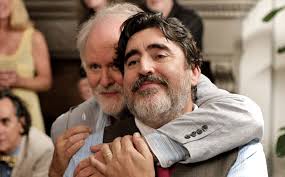Love is Strange is one of the best movies I’ve seen in months. It is tender, authentic, and even delicate in its interplay of family dynamics.
John Lithgow and Alfred Molina play Ben and George, two men who have lived together in love for decades. When they marry, George loses his job as a music teacher at a Catholic school, a scenario that seems “ripped from the headlines” and, thus, more than plausible.
The financial jeopardy caused by his firing causes Ben and George to sell their apartment and temporarily move in with family members – separately. Given the constraints of New York City real estate, this, too, is a believable turn of events.
No matter how much family members may love and respect one another, close quarters and different lifestyles are bound to take a toll, as is separation for partners whose lives have been inextricably linked for so many years.
On its own merits, I would love Love is Strange, but there is more for me to admire about the film in the form of three intertextual strands.
First, I have mentioned how the film addresses a relevant issue that Frank Bruni writes about today in his New York Times op-ed column – the Catholic church’s policy of firing employees who marry same-sex partners even when their status as partners has been known beforehand.
And, there is a second strand that, frankly, dazzled me when I was watching the film. Love is Strange is essentially an updated version of one of the saddest movies I have ever seen, Leo McCarey’s 1937 film Make Way For Tomorrow in which Beulah Bondi and Victor Moore play the deeply in love couple forced to separate over financial difficulty that leads to the loss of their home.
Sigh. Just thinking about this film makes me weary and heartsick, which may not make you want to see Make Way For Tomorrow, but you should anyway.
Finally, the film strikes me as an interesting addition to cinematic depictions of “good teachers” who (usually unsuccessfully) challenge institutions of education and the status quo. George does that when calls the priest who fires him out on the hypocrisy of the church and, later, communicates with the parents of the students he taught music.
One of the marvels of Love is Strange is its surface simplicity and accessibility overlaying a much more complex story. The performances are strong, the storytelling subtle, and the situation is thought-provoking, but it is the tension between the simplicity of the situation and the complexity of finding a solution for it along with the intertextual narrative elements that makes me a fan…and I am a fan of Love is Strange.

beautifuly written and makes me want to see it even more, i hate boring films